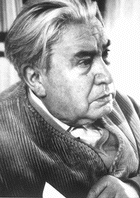Bio & Itinerary (2)
Czech (3)
Deutschland (5)
Hungary (2)
Polska (12)
Post-Trip (1)
Pre-Trip (2)
Russia (10)
The Poets (4)
Travel Tips (1)
* Wien Wieder Sehen (Definitely!)
* Wunderschones Wien!
* Voyage on the Blue Danube (In Pictures)
* Better in Budapest
* Bronchitis in Budapest
* 287 Steps!!
* In Search of Seifert
* Countryside Train, Czech-In!
* Szymborska, Sight-free Day
* Krakow Check-In
* Warsawa, Marie Curie, English Teachers
* Da svidanya!
* 'Snow', Uma, Pushkin & General St. Pete's Nostalgia
* Thelma's Tour Guide
* Peter's Palaces, Fountains, Boats
* Dostoyevsky, Rooftops, Trams, Springer News
* Hermitage
* Rain, Sunsets, Ballet, Neva, Music, Music, Music!
* Anna, Vodka, Lilacs & Elf Shoes
May 02, 2004

If You Call Poetry...
If you call poetry a song
- and people often do -
then I've sung all my life.
And I marched with those who had nothing,
who lived from hand to mouth,
I was one of them.
I sang of their sufferings,
their faith, their hopes,
and I lived with them through whatever
they had to live through. Through their anguish,
weakness and fear and courage
and poverty's grief.
And their blood, whenever it flowed,
spattered me.
Always it flowed in plenty
in this land of sweet rivers, grass and butterflies
and passionate women.
Of women, too, I sang.
Blinded by love
I staggered through my life,
tripping over dropped blossoms
or a cathedral step.
Source: The Selected Poetry of Jaroslav Seifert by Jaroslav Seifert, Ewald Osers, translator. MacMillan Publishing Company, 1987.
Brief Biography
Jaroslav Seifert was born on 23 September 1901 into a working-class family living in Zizkov, a suburb of Prague. He attended secondary school and soon began devoting himself to writing poetry and to journalism.
He made his debut in 1918; he published his first collection of poems in 1921. He belonged to the extreme left wing of the Social Democratic Party, which, in 1921, was to form the core of the Communist Party in newly formed Czechoslovakia. He became an editor of communist newspapers and magazines (Rovnost, Srsatec, Reflektor) while, at the same time, working at the communist publishing house and bookstore. In the 1920s he was a leading representative of the Czechoslovakian artistic avant-garde; he served on the editorial staffs of several of its publications. He translated from the French (Apollinaire, Verlaine, and others).
In March 1929, together with six other important communist writers, he signed a manifesto protesting against Bolshevik tendencies in the new leadership of Czechoslovakia's Communist Party, and together with his fellow signers, he was expelled from the party. From 1930, he served in various editorial posts within the social democratic press (Pestré kvety, Ranní noviny).
During the German occupation, he was editor of the daily Národní práce and after 1945, of the trade-union daily Práce. During the years 1945-1948, he edited the literary monthly Kytice. Since 1949, when he was forced to leave journalism, he has devoted himself exclusively to literature.
In 1936, 1955, and 1968, his poetry was awarded state prizes. In 1967, he was designated National Artist. In 1968, he was elected to the post of Chairman of the Czechoslovakian Writers' Union. During the years 1969-1970, he was Chairman of the Czech Writers' Union. He received the Nobel Prize in Literature in 1984.
Seifert died in Prague on January 10, in 1986. As a People's Artist, Seifert was entitled to a state funeral, and it became a national event.